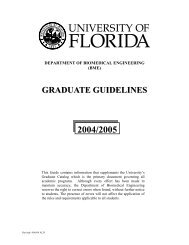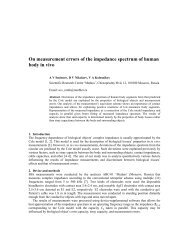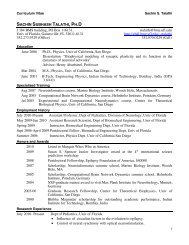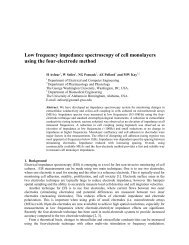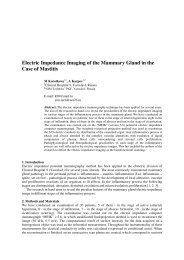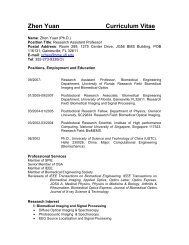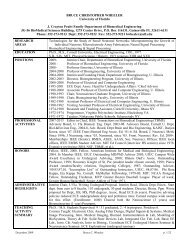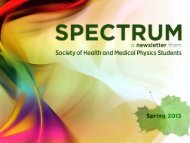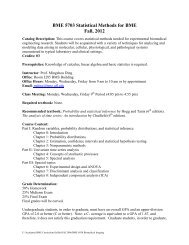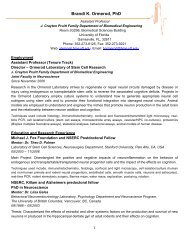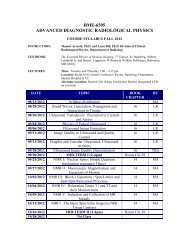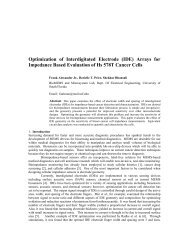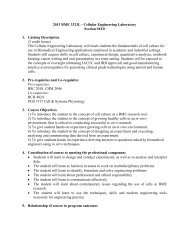Spring 2010 Syllabus - University of Florida
Spring 2010 Syllabus - University of Florida
Spring 2010 Syllabus - University of Florida
You also want an ePaper? Increase the reach of your titles
YUMPU automatically turns print PDFs into web optimized ePapers that Google loves.
1<br />
Standardized <strong>Syllabus</strong> for the College <strong>of</strong> Engineering<br />
BME 6938 –BIOMATERIAL IMMUNOMODULATION<br />
Catalog Description: This course will examine current biomaterial platforms relevant to the<br />
field <strong>of</strong> immunology and fundamental interactions <strong>of</strong> immune cells with implanted materials.<br />
The course format for this course consists <strong>of</strong> a combination <strong>of</strong> lectures and journal club-style<br />
student presentations. (3 credit hours)<br />
1. Pre-requisites and Co-requisites: none<br />
2. Relationship <strong>of</strong> course to program outcomes (ABET only): N/A<br />
3. Instructor: Benjamin Keselowsky<br />
a. Office location: MBI L1-181<br />
b. Telephone: 273-5878<br />
c. E-mail address: bkeselowsky@bme.ufl.edu<br />
d. Web site: www.bme.ufl.edu<br />
e. Office hours: by appointment<br />
4. Teaching Assistant:<br />
a. Office location:<br />
b. Telephone:<br />
c. E-mail address:<br />
d. Office hours:<br />
5. Meeting Times: T: Tuesday (6 th & 7 th : 12:50 – 2:45), Thursday (6 th : 12:50 – 1:40)<br />
6. Meeting Location: NEB 350<br />
7. Reference Texts:<br />
(1) Title: Molecular Biology <strong>of</strong> the Cell, 4 th Ed.<br />
Author: Alberts et al.<br />
Publication date: 2002, Garland Press<br />
ISBN: 0815332181<br />
(2) Title: Biomaterials – The Intersection <strong>of</strong> Biology and Materials Science<br />
Author: Temen<strong>of</strong>f & Mikos<br />
Publication date: 2008, Pearson Education, Inc.<br />
ISBN: 0130097101<br />
(3) Title: Janeway’s Immunology, seventh edition<br />
Author: Murphy, Travers, Walport<br />
Publication date: 2008, Garland Science<br />
ISBN: 780815341239<br />
(2) Title: Biomaterials Science, 2 nd Ed.<br />
Editors: Ratner, H<strong>of</strong>fman, Schoen, Lemons<br />
Publication date: 2004, Elsevier, Inc.<br />
ISBN: 9780125824637<br />
8. Course Outline: See attached calendar <strong>of</strong> scheduled lectures. This schedule is tentative and<br />
subject to change.<br />
9. Attendance and Expectations:<br />
Attendance: Regular attendance at lectures is strongly encouraged and will be necessary in<br />
order to pass the course.
2<br />
Homework: Homework is heavily weighted in this course, so assignments should be<br />
completed with care and according to instructions. Students are encouraged to work together<br />
in groups on homework assignments in order to determine solution methods for the<br />
problems. However, each student must complete his or her own work on the problem and<br />
turn in an individual assignment that is their own work. Direct copying <strong>of</strong> another student’s<br />
solution will be considered plagiarism and a violation <strong>of</strong> the <strong>University</strong> Honor Code.<br />
In general, late assignments will not be accepted. However, each student will be<br />
permitted one late homework assignment with the provision that the assignment be turned in<br />
no more than one week past the original due date. Extraordinary cases will be considered on<br />
an individual basis and must be discussed with the instructor before the due date <strong>of</strong> the<br />
assignment.<br />
Homework assignments must conform to the following specifications:<br />
Use one side only <strong>of</strong> 8½”x11” paper.<br />
Each assignment should have the student’s name, assignment number, and due date <strong>of</strong><br />
the assignment.<br />
<br />
<br />
<br />
<br />
Multiple pages should be stapled on the upper left corner.<br />
Solutions should be neat and pr<strong>of</strong>essional in appearance and as easy to follow as<br />
possible. Partial credit will be given for incorrect answers, but only if the solution<br />
can be followed and understood.<br />
Any programs should have a variable list with variables defined and explained (with<br />
units), input specifications should be given, output must be clearly labeled, and<br />
sufficient comments should be added so that the problem can be graded easily (see<br />
statement about partial credit). A top down design should be used (i.e., a program<br />
that relies on functions and subroutines). Any plots and graphs should have clearly<br />
labeled axes with units.<br />
Assignments that do not conform to the requirements will be returned ungraded.<br />
Resubmission <strong>of</strong> an ungraded assignment will be permitted within one week <strong>of</strong><br />
having it returned, but it will count towards the one allowable late assignment. If one<br />
late assignment has already been used, then the returned assignment will not be<br />
counted.<br />
Exams: Exams will be in-class or take-home. Disputes in exam grading should be addressed<br />
in writing to the instructor within one week from the date the exam is returned. Changes in<br />
the exam grade are solely at the discretion <strong>of</strong> the instructor.<br />
Personal responsibility: Students are personally responsible for all information disseminated<br />
during lectures, including homework assignments and due dates, exam dates, course material,<br />
etc. For a missed lecture, it is the student’s responsibility to obtain information from the<br />
lecture.<br />
10. Grading: The final course grade will be determined based upon the following percentages:<br />
Homework/Journal Club – 40%<br />
Exam – 30%<br />
Research Proposal – 30%<br />
11. Grading Scale:<br />
A 90-100, B+ 85-89, B 80-84, C+ 75-79, C 70-74, D+ 65-69, D 60-64, E < 60<br />
Grades will not be curved, so students are not in competition with each other for grades (it is<br />
possible for everyone to earn an A in the class).
3<br />
12. Make-up Exam Policy: No make-up exams will be given. An exam missed without the<br />
prior approval <strong>of</strong> the instructor will result in a grade <strong>of</strong> zero for the exam.<br />
13. Honesty Policy: All students admitted to the <strong>University</strong> <strong>of</strong> <strong>Florida</strong> have signed a statement<br />
<strong>of</strong> academic honesty committing themselves to be honest in all academic work and<br />
understanding that failure to comply with this commitment will result in disciplinary action.<br />
This statement is a reminder to uphold your obligation as a UF student and to be honest in all<br />
work submitted and exams taken in this course and all others.<br />
14. Accommodation for Students with Disabilities: Students requesting classroom<br />
accommodation must first register with the Dean <strong>of</strong> Students Office. That <strong>of</strong>fice will provide<br />
the student with documentation that he/she must provide to the course instructor when<br />
requesting accommodation.<br />
15. UF Counseling Services: Resources are available on-campus for students having personal<br />
problems or lacking clear career and academic goals. The resources include:<br />
<strong>University</strong> Counseling Center, 301 Peabody Hall, 392-1575, Personal and Career<br />
Counseling.<br />
SHCC mental Health, Student Health Care Center, 392-1171, Personal and Counseling.<br />
Center for Sexual Assault/Abuse Recovery and Education (CARE), Student Health Care<br />
Center, 392-1161, sexual assault counseling.<br />
Career Resource Center, Reitz Union, 392-1601, career development assistance and<br />
counseling.



